Related Research Articles
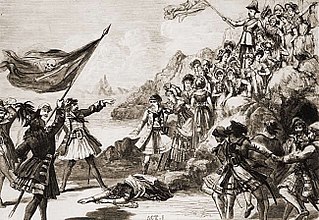
The Pirates of Penzance; or, The Slave of Duty is a comic opera in two acts, with music by Arthur Sullivan and libretto by W. S. Gilbert. Its official premiere was at the Fifth Avenue Theatre in New York City on 31 December 1879, where it was well received by both audiences and critics. Its London debut was on 3 April 1880, at the Opera Comique, where it ran for 363 performances.
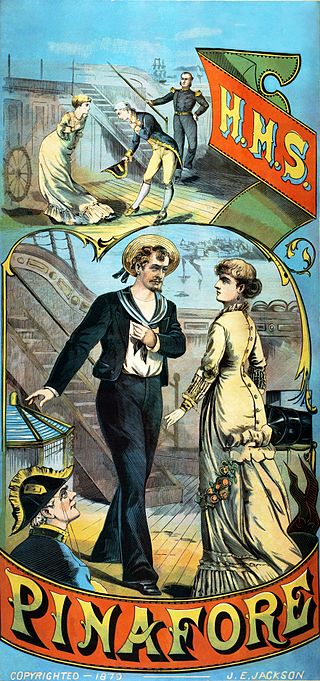
H.M.S. Pinafore; or, The Lass That Loved a Sailor is a comic opera in two acts, with music by Arthur Sullivan and a libretto by W. S. Gilbert. It opened at the Opera Comique in London, on 25 May 1878 and ran for 571 performances, which was the second-longest run of any musical theatre piece up to that time. H.M.S. Pinafore was Gilbert and Sullivan's fourth operatic collaboration and their first international sensation.

Anything Goes is a musical with music and lyrics by Cole Porter. The original book was a collaborative effort by Guy Bolton and P. G. Wodehouse, revised considerably by the team of Howard Lindsay and Russel Crouse. The story concerns madcap antics aboard an ocean liner bound from New York to London. Billy Crocker is a stowaway in love with heiress Hope Harcourt, who is engaged to Lord Evelyn Oakleigh. Nightclub singer Reno Sweeney and Public Enemy Number 13, "Moonface" Martin, aid Billy in his quest to win Hope. The musical introduced such songs as "Anything Goes", "You're the Top", and "I Get a Kick Out of You".
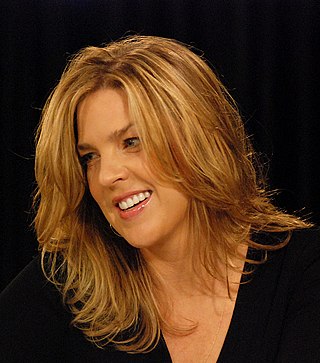
Diana Jean Krall is a Canadian jazz pianist and singer known for her contralto vocals. She has sold more than 15 million albums worldwide, including over six million in the US. On December 11, 2009, Billboard magazine named her the second greatest jazz artist of the decade (2000–2009), establishing her as one of the best-selling artists of her time.

John Allan Jones is an American singer and actor.

Raymond Edward "Gilbert" O'Sullivan is an Irish singer-songwriter who experienced success during the early 1970s with songs such as "Alone Again (Naturally)", "Clair", and "Get Down". O'Sullivan's songs are often marked by his distinctive, percussive piano playing style and observational lyrics using word play.

"Ain't That a Shame" is a song written by Fats Domino and Dave Bartholomew. Domino's recording of the song, originally stated as "Ain't It a Shame", released by Imperial Records in 1955, was a hit, eventually selling a million copies. It reached number 1 on the Billboard R&B chart and number 10 on the pop chart. The song is ranked number 438 on Rolling Stone magazine's 500 Greatest Songs of All Time list.
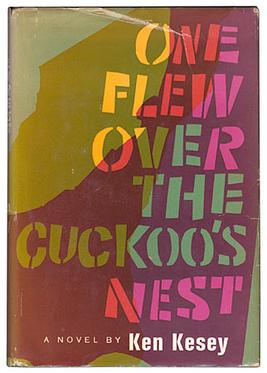
One Flew Over the Cuckoo's Nest is a novel by Ken Kesey published in 1962. Set in an Oregon psychiatric hospital, the narrative serves as a study of institutional processes and the human mind, including a critique of psychiatry and a tribute to individualistic principles. It was adapted into the Broadway play One Flew Over the Cuckoo's Nest by Dale Wasserman in 1963. Bo Goldman adapted the novel into a 1975 film of the same name directed by Miloš Forman, which won five Academy Awards.

The Swan Princess is a 1994 American animated fantasy film based on the ballet Swan Lake. Featuring Michelle Nicastro, Howard McGillin, Jack Palance, John Cleese, Steven Wright, Sandy Duncan, and Steve Vinovich, the film is directed by former Disney animation director Richard Rich and scored by Lex de Azevedo. The film was distributed by New Line Cinema in the United States and by Columbia TriStar Film Distributors International outside the US. It was released theatrically on November 18, 1994, and grossed $9.8 million against a $21 million budget, becoming a box-office bomb, partly due to struggling competition with a re-release of The Lion King (1994). The film later became popular through home video releases and has since been followed by a series of direct-to-video sequels starting in 1997.

Pipe Dream is the seventh musical by the team of Richard Rodgers and Oscar Hammerstein II; it premiered on Broadway on November 30, 1955. The work is based on John Steinbeck's novel Sweet Thursday—Steinbeck wrote the novel, a sequel to Cannery Row, in the hope of having it adapted into a musical. Set in Monterey, California, the musical tells the story of the romance between Doc, a marine biologist, and Suzy, who in the novel is a prostitute; her profession is only alluded to in the stage work. Pipe Dream was not an outright flop but was a financial disaster for Rodgers and Hammerstein.
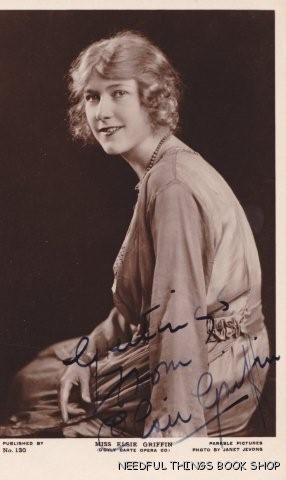
Elsie Griffin was an English opera singer, best known for her performances in the soprano roles of the Savoy Operas with the D'Oyly Carte Opera Company.
Derek Reginald Lamb was a British animation filmmaker and producer. While serving as executive producer of the National Film Board of Canada's English Animation Studio from 1976 to 1982, he produced the Oscar-winner Special Delivery, directed by John Weldon and Eunice Macaulay, and produced and scripted Eugene Fedorenko's Every Child. He also created numerous animated sketches for Sesame Street, sometimes in collaboration with John Canemaker.
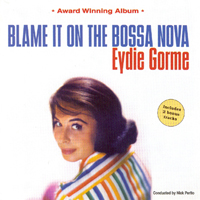
"Blame It on the Bossa Nova" is a song written by Cynthia Weil (lyrics) and Barry Mann which was a 1963 hit single for Eydie Gormé, reaching number 7 on the Hot 100 in Billboard in March 1963. The song also peaked at number 32 in the UK, whereas "Yes, My Darling Daughter" became the biggest hit for Eydie there, reaching number 10.
For nearly 150 years, Gilbert and Sullivan have pervasively influenced popular culture in the English-speaking world. Lines and quotations from the Gilbert and Sullivan operas have become part of the English language, such as "short, sharp shock", "What never? Well, hardly ever!", "let the punishment fit the crime", and "A policeman's lot is not a happy one".

The Story of Gilbert and Sullivan is a 1953 British musical drama film dramatisation of the collaboration between Gilbert and Sullivan. Librettist W. S. Gilbert and composer Arthur Sullivan, portrayed by Robert Morley and Maurice Evans, co-wrote fourteen extraordinarily successful comic operas, later referred to as the Savoy Operas, which continue to be popular today.
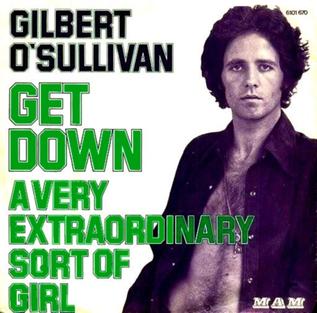
"Get Down" is a song by Irish singer-songwriter Gilbert O'Sullivan, from his 1973 album I'm a Writer, Not a Fighter. Released as a single, it spent two weeks at the top of the UK Singles Chart in April 1973, was also a number-one hit in Ireland and was a top-ten hit in the United States and Canada. The song was originally used by O'Sullivan as a piano warm-up tune, but was eventually extended into a full song and released as a single; O'Sullivan recorded and released the song as a change from his more melancholy pieces.

"Saint Veronika" is the third official single by Billy Talent from their fourth album, Billy Talent III.

I'm a Writer, Not a Fighter is the third studio album by Irish singer-songwriter Gilbert O'Sullivan, originally released by MAM Records in September 1973. After becoming one of the most successful performers worldwide in 1972, O'Sullivan pursued new directions with the album, taking influence from rock music and funk and incorporating an array of then-new electric keyboards, as well as emphasizing a new rhythmical focus. The album was recorded "on and off" with producer Gordon Mills at the latter's studio, and although several overdubs were recorded in the United States, O'Sullivan referred to the album as an ultimately "very ad hoc home-based" project.

Alissa White-Gluz is a Canadian singer, best known as the lead vocalist of the Swedish melodic death metal band Arch Enemy, and former lead vocalist and founding member of the Canadian metalcore band the Agonist. Her vocal style includes both growling and clean vocals (singing). Although primarily associated with melodic death metal and metalcore, she has appeared as a guest vocalist for power metal, symphonic metal and deathcore bands, notably Kamelot, Delain, Carnifex and Powerwolf, and has performed live with Nightwish and Tarja Turunen.

My Thoughts Exactly is a memoir by English singer-songwriter Lily Allen. The book was published on 20 September 2018, and several extracts from the book generated considerable press coverage prior to release. The book covers a variety of topics, such as "feminism, the tabloids, money, faking orgasms, bad managers, fame, sexual abuse, mental health, narcissism, co-dependency, festivals, motherhood, stalking and parking tickets". It received positive reviews.
References
- 1 2 3 "The Whole World Over". Vaughan Williams Memorial Library .
- 1 2 Traditional. "She Was Poor But She Was Honest". songfacts.com. Retrieved 18 June 2020.
- 1 2 Anonymous. "She Was Poor but She Was Honest (It's the Same the Whole World Over)". antiwarsongs.org. Retrieved 18 June 2020.
- ↑ "Poverty". Oxford Reference . Retrieved 18 June 2020.
- ↑ Pippert, Wesley G. (5 March 1981). "'It's the same the whole world over, 'It's the poor that gets the blame, 'It's the rich which gets the gravy; 'Isn't that a blipping shame?'". UPI . Retrieved 18 June 2020.
- ↑ Anonymous. "She Was Poor but She Was Honest". PoetryNook. Retrieved 18 June 2020.
- ↑ Traditional. "She Was Poor But She Was Honest". songfacts.com. Retrieved 18 June 2020.
- ↑ "She Was Poor but She Was Honest". secondhandsongs.com. Retrieved 18 June 2020.
- ↑ Bennett, Billy. "She Was Poor, But She Was Honest". 45worlds.com. Retrieved 18 June 2020.
- ↑ Lamb, Derek (1962). "She Was Poor but She Was Honest: Nice, Naughty and Nourishing Songs of the London Music Hall and Pubs". Smithsonian Folkways . Retrieved 18 June 2020.
- ↑ "The Whole World Over". IBDB . Retrieved 18 June 2020.
- ↑ Glass, Julia (2007). The Whole World Over. Penguin Random House . ISBN 9781400075768 . Retrieved 18 June 2020.
- ↑ Gilbert O'Sullivan (2018). "Gilbert O'Sullivan". Discogs . Retrieved 18 June 2020.